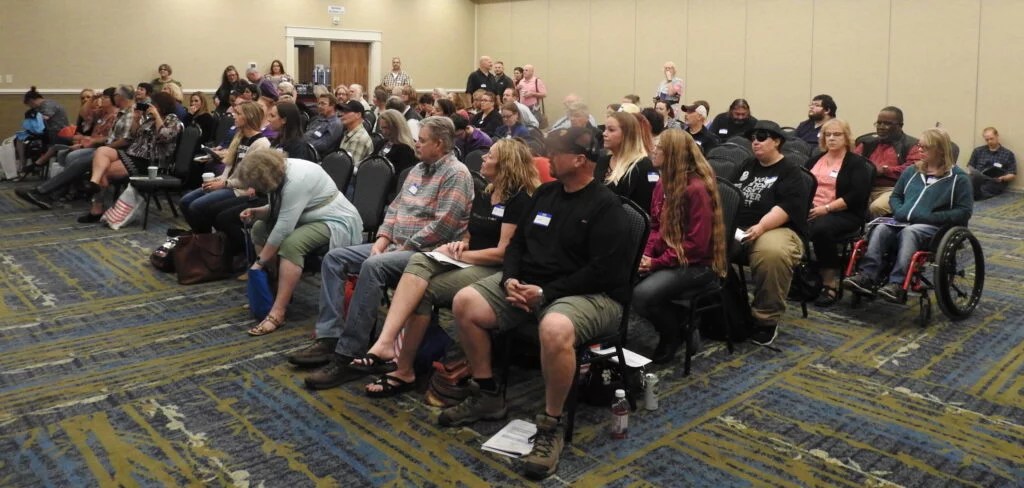We are a network of individuals who are on the path of recovery.
We identify as being in recovery from mental health, substance abuse and or addiction struggles. Together we share information, provide peer support, advocate with a united voice and improve the system. We come from places all across Montana, with different stories and experiences but together we make a difference. This is the Recovery Movement in Montana.


Realizing Recovery Blog
The Inner Child and My Mental Health Disorder
What people see on the outside is just a hint of what is happening within. Moving through life and feeling the world while my trauma weaves stories about my emotions creates a mental storm legitimized by science as a mental health disorder. Some people call this empathic or highly sensitive, being tuned into what my immediate circle feels and carrying the unspoken weight of our disease. Mental health goes back as far as I could research in my family; it is the generational pattern that has been transferred from mother to child; it manifests as the burning of the internal turmoil in the middle of my life and replaces the peace my heart came here to feel.
Mental Health Awareness Month
May is Mental Health Awareness Month, and as someone who is in recovery from substance use disorder and mental health issues, I am grateful for this opportunity to share my story and help raise awareness about mental health. I live in Billings, Montana, and even here I’ve found that it can be challenging for people in our community to find the resources and support they need to manage these conditions. That’s why I feel it’s essential to talk openly about mental health to help reduce stigma and encourage people to seek help when they need it.
A Journey to Wellness
I recently learned about the 8 Dimensions of Wellness. Before I dive into these, I first want to define what “wellness” means. Wellness is the “act of practicing healthy habits on a daily basis to attain better physical and mental health outcomes.1” For many people, wellness is associated with physical health, but not necessarily with mental health. I know that was true for me for much of my life. By taking stock of different areas of my life and consciously making a plan for how to improve these various aspects, I can increase my quality of life. I am just starting this journey myself and have a ways to go, but I believe with guidance from these dimensions, I can make some improvements in myself.
The Importance of Mental Health Awareness
When I started getting diagnosed with mental health conditions, I was still a teenager. I was ashamed, scared, and felt like I was doomed. I come from a family that has both mental health conditions and substance abuse disorders, so I was aware of what they both can look like. It hit me hard, and even though I had seen struggles within my family’s dynamics, I still held shame and guilt from my situation. I later learned that the shame and guilt was not mine to carry, but before that, I carried it like I was packing luggage around, everywhere I went.
May is Mental Health Awareness Month!
Check out stickers and other resources for Mental Health Awareness Month and Children’s Mental Health Acceptance Week!
Mental Health Awareness Month 2023
I have, over the past couple of years, been homing in on specific dimension of wellness and working on the dimension for an entire year. Each of these dimensions plays a key role in my overall mental health.
Forgiveness is Freedom
If I could give another word for recovery, it would be forgiveness because if resentment is the blind spot of addiction, then forgiveness is a corrected vision. Forgiveness is an inner connection versus an emphasis on the crisis. In other words, resentment is fear, and forgiveness is love.
Practices, Principles, and Purpose of Forgiveness
Forgiveness is a big part of a healing journey. It takes a lot of acceptance to be able to forgive and to acknowledge there is a need to understand that whatever it is that is holding one back, or is causing inner conflicts, is not always ours to own. We do not have to completely understand the reasoning behind one’s negative doing to us, we don’t ever have to forget, but being able to forgive, can allow healing and growth to continue.
My Journey to Forgiveness
What is the true meaning of forgiveness? Psychologists generally define forgiveness as a conscious, deliberate decision to release feelings of resentment or vengeance toward a person or group who has harmed you, regardless of whether they actually deserve your forgiveness.
Forgiveness
What an amazing subject to talk about. This will be my first time getting share with you on the topic of forgiveness. I would like to start off with saying if recovery is possible, so is forgiveness. I believe that it is hard to have one without the other. As I was growing up I had examples of forgiveness in my life.
Advocacy
Check out our new page dedicated to tracking state and federal bills, executive orders, and lawsuits.
 Standing up for what we believe is right, having a voice, making choices in recovery, and sharing our own recovery story are some of the things that make up advocacy and self-advocacy.
Standing up for what we believe is right, having a voice, making choices in recovery, and sharing our own recovery story are some of the things that make up advocacy and self-advocacy.
Let’s start with self-advocacy which refers to an individual’s ability to effectively communicate, convey, negotiate, or assert his/her own interests, desires, needs, or rights. It involves making informed decisions and taking responsibility for those decisions (Van Reusen et al., 1994).
Knowing yourself and your strengths, needs, and interests is the first step toward advocating for your rights. Once we begin to find our way on the path of recovery, we may want to begin to advocate for ourselves with those around us—peer supporters, friends, family, service providers, and doctors. These conversations may be difficult, but having them is vital to your recovery. Remember, you are the expert on yourself.
It may be that prior to getting on the path to recovery, others were making decisions for you or acting in what they believed to be your best interest. Now may be the time for you to let others know what you believe to be in your best interest. You may find yourself in the process of taking control and making decisions affecting your life and perhaps others’ lives. This process of self-determination means making informed choices, problem solving, setting and attaining goals—essentially being a self-advocate.
Advocacy or advocating for others may be something you are interested in doing. Advocating for another person isn’t about acting in a person’s perceived best interest, but it is standing with a person to ensure they are able to articulate and obtain what they want or need. Perhaps you may consider speaking up and advocating for various changes in the services in your community.
Here are a few examples of advocacy:
- Speak to your legislature or a special committee.
- Get involved with an advocacy group or organization.
- Share your recovery story to support others in recovery.
- Whether advocating for yourself, for others, for your community, or as part of an organization, advocacy is very self-empowering. You can make a real difference in your life, the lives of others, and even the community.
- Reach out to Montana’s Peer Network and share your recovery story on one of our “Recovery Talks” podcasts.
Advancing Advocacy Blog
Societal Issues Affecting Mental Health
It is hard to not see suffering on a daily basis around the world, in the United States and here in Montana. When I tune in for my daily dose of news, I am often struck by the lack of awareness around mental health related issues. For example, in Texas where the extreme flooding occurred there is virtually no reporting on mental health counseling, or peer support for the massive amount of grief and loss that is taking place. In the nearly weekly reporting of mass shootings at places of work, schools and in our communities across the nation, we fail to address mental health needs.
Snapshot - Challenges in the CBHPSS Workforce
The certified behavioral health peer support specialist workforce has faced many challenges since its inception 8 years ago. We fought to establish ourselves in the behavioral health system, we have had to educate and inform the public, and we have had to grow the workforce. MPN has been training peer supporters since 2015 long before certification went into effect in 2018. The basis for the training then and now is the National Practice Standards from SAMHSA. We have trained more than one thousand peer supporters during the last ten years which has provided us with a unique perspective on the workforce. We are not new to the game as are some of the other trainers. Nor are we from out of state here to get wealthy, then disappear after we get a check. We want to see a strong behavioral health peer support workforce now and into the future. In order to do that there needs to be a platform for identifying and addressing the issues. Montana lacks that platform. One that is free from outside influence. At MPN, we have tried many times over the years to participate in such an effort only for it to get corrupted, forcing us to step away. In this article I have broken down the most notable challenges in the behavioral health peer support workforce and some possible solutions.



